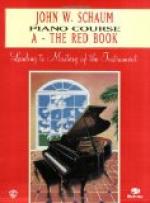“Perhaps I have what might be called a natural technic; that is I have a natural aptitude for it, so that I could acquire it easily, and it stays with me. Hofmann has that kind of natural technic; so has d’Albert. Of course I have to practise technic; I would not allow it to lapse; I love the piano too much to neglect any part of the work. An artist owes it to himself and the public to keep himself up in perfect condition—for he must never offer the public anything but the best. I only mean to say I do not have to work at it as laboriously as some others have to do. However, I practise technic daily, and will add that I find I can do a great deal in a short time. When on tour I try to give one hour a day to it, not more.”
Speaking of the action of fingers, Mr. Bachaus continued:
“Why, yes, I raise my fingers whenever and wherever necessary—no more. Do you know Breithaupt? Well, he does not approve of such technical exercises as these (illustrating); holding down some fingers and lifting others, for technical practise, but I do. As for the metronome, I approve of it to cultivate the sense of rhythm in those who are lacking in this particular sense. I sometimes use it myself, just to see the difference between the mechanical rhythm and the musical rhythm—for they are not always the same by any means.
“Do you know these Technical Exercises of Brahms? I think a great deal of them, and, as you see, carry them around with me; they are excellent.
“You ask me about octaves. It is true they are easy for me now, but I can remember the time when they were difficult. The only alternative is to work constantly at them. Of course they are more difficult for small hands; so care must be taken not to strain nor over-tire the hand. A little at a time, in frequent doses, ought in six months to work wonders. Rowing a boat is good to develop wrists for octave playing.
“You ask if I can tell how I obtain power. That is a very difficult question. Why does one child learn to swim almost immediately, while another cannot master it for a long time? To the first it comes naturally—he has the knack, so to speak. And it is just so with the quality of power at the piano. It certainly is not due to physique, nor to brute strength, else only the athlete would have sufficient power. No, it is the ‘knack,’ or rather it is the result of relaxation, as you suggest.
“Take the subject of velocity. I never work for that special thing as some do. I seldom practise with great velocity, for it interferes with clearness. I prefer to play more slowly, giving the greatest attention to clearness and good tone. By pursuing this course I find that when I need velocity I have it.
“I am no pedagogue and have no desire to be one. I have no time for teaching; my own studies and concert work fill all my days. I do not think that one can both teach and play successfully. If I were teaching I should no doubt acquire the habit of analyzing and criticizing the work of others; of explaining and showing just how a thing should be done. But I am not a critic nor a teacher, so I do not always know how I produce effects. I play ‘as the bird sings,’ to quote an old German song.




